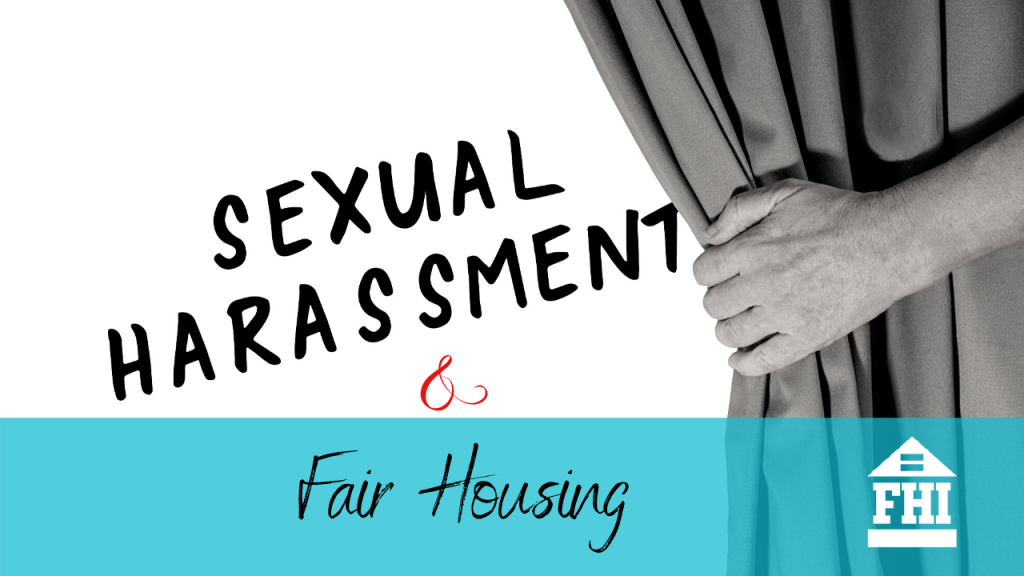Episode 18 of Fair Housing Insiders

What is sexual harassment in fair housing? The interesting thing about fair housing and sexual harassment is that while it is very similar to employment sexual harassment, there are some key differences when it comes to fair housing. Join us as we discuss these differences and review the best practices you need to utilize.
Estimated reading time: 8 minutes
Table of contents
Episode 18 of our Fair Housing Insiders. In this session, we cover the following questions:
- What is sexual harassment in housing?
- Can being too friendly get you in trouble?
- How do you find a balance?
- What are some best practices to prevent sexual harassment claims?
Highlights of Episode 18 – Sexual Harassment and Fair Housing
What is sexual harassment in housing?
When we say sexual harassment in fair housing, we are talking about the personal interaction between employees, contractors (vendors), and residents. There is a need for targeted sexual harassment training to avoid a complaint and to handle it properly if one has been filed.
Consider the following scenario. You receive a complaint from a resident that the pest control contractor made them feel uncomfortable, and they claim that this person made a pass at them. Your first inclination might be to shrug it off. You know this vendor and he is a known jokester, and you feel that the resident is just touchy.
Ignoring this kind of complaint is what can lead to litigation and a fair housing complaint. The best way to mitigate that liability is to have a fair housing clause in your contract or agreement explaining that the vendor and its staff cannot discriminate against anybody and list all the reasons, including sexual harassment.
And if you don’t have that kind of fair housing clause, you can always write a letter to each vendor with the same information.
This sets clear guidelines that have to be followed. If a sexual harassment claim is made, your policies can be referenced and action can be taken accordingly with everything being documented per fair housing best practices.
Can being too friendly get you in trouble?
Of course, we want our staff to be friendly, but where do we draw the line?
The line is not always clearly defined, as you can see in situations like giving a compliment.
Let’s take an example. An employee compliments a resident by saying: “Wow, that dress looks good on you!” That seems fine, well below anything that could be considered sexual harassment but what if they continued on: “The color brings out your eyes, and it complements your figure really well.”
Too friendly? The legal definition of sexual harassment is asking for sexual favors and doing it in a manner that suggests there will be a benefit to the person: they’ll get their rent reduced, they’ll get better services, things like that. This is called quid pro quo.
Does this mean we are free to say anything as long as we aren’t getting something in return? Perhaps by making comments like the one stated above?
When we talk about sexual harassment, it may be difficult making distinctions about what’s legal and illegal, because there are broader definitions that include the culture or environment.
A casual conversation or compliment dropped one time is probably not going to end in a sexual harassment complaint. However, the concern comes in when there is an environment that makes it okay to say things that are increasingly personal.
Perhaps continuously commenting on someone’s appearance or repeatedly telling inappropriate jokes becomes a culture that is accepted by most. However, this can lead to a charge of sexual harassment and a fair housing complaint.
We need to remember that what one person thinks is okay may not be acceptable for another. Having in place the right fair housing policies and ongoing sexual harassment training that focuses on sensitivity can avoid the trap of staff being too friendly with the residents.
How do you find a balance?
As stated before, determining a clear line not to cross can be difficult. We want our staff to be friendly with our residents. This is important to have a good working relationship.
One of the best ways to teach balance is through role-playing. Have your staff start with a scenario like the one above. Continue to add layers to the conversation and discuss openly when the staff members think a line was crossed. When they felt it crossed into sexual harassment territory.
Doing this also shows people’s differing tolerance levels. What one staff member may feel is acceptable, another may feel meets the definition of sexual harassment. This will open up the opportunity to have some great dialogue and drill down on specifics.
By having these practice sessions, your staff will now have a clear set of standards in mind that will not be based on personal opinion but on best practices that meet the Fair Housing Act’s standards.
You may also like: The Supreme Court’s Ruling on Sexual Orientation and Gender Identity
What are some best practices to avoid sexual harassment claims?
Having a fair housing complaint right now filed with HUD alleging sexual harassment is devastating because they take an incredibly aggressive enforcement posture in those complaints.
We have discussed sexual harassment training, role-playing as well as documentation of companies’ policies. All are an integral part of ensuring fair housing best practices when it comes to sexual harassment. But what about a policy regarding staff dating residents? What are your responsibilities if there is a claim of sexual harassment between two residents?
There’s a little bit of a danger in permitting romantic relationships between staff and residents because presumably those romantic relationships are eventually going to end. And when they end, things can get very unpleasant.
Some companies have a general policy that personal relationships are frowned on, but if it happens it needs to be reported so that the company is aware of it. If this is the case, there needs to be an exact reporting protocol that is well-known, and should include specifically to whom these types of relationships need to be disclosed.
In the case of two residents who have had a relationship come to a not-so-amicable end, what responsibility does management have? Under the Fair Housing Act, you are required to investigate if one resident makes a claim that another resident is sexually harassing them.
Suppose the investigation finds the claim to be true. In that case, the offending party needs to be notified that the behavior should stop immediately and that sexual harassment in housing is not permitted. It will be viewed as a violation of the lease and they may lose their residence.
5 Recommended Steps
How to prevent sexual harassment claims and follow fair housing best practices:
- Contact person(s)
All employees and residents should be informed of the name of the person to contact with any allegations of harassment, sexual or otherwise. There should be a second person also named, in case the allegation is against the first contact person. - Conduct an investigation
If a resident complaint is made that the statements or actions of another are offensive (even if the term “sexual harassment” is not used), regardless of the expected outcome, management should immediately conduct an “investigation” of the matter. - Document interviews
An investigation includes interviewing all relevant parties, documenting the interviews, and responding to the complainant in writing. - Take “appropriate action”
If the investigation shows that the conduct was offensive or a violation of company policy, appropriate action should be taken with the employee, resident, or vendor and documented. What “appropriate action” is will depend upon the seriousness of the conduct and who is involved (employee, resident, or vendor). - Document the file
If the investigation does not substantiate the allegations of the complainant, the file should be documented with a statement by the supervisor of why it appears the allegations were without merit, and an appropriate letter should be sent to the person who made the complaint.
Provide Regular Fair Housing Training and Reminders
The best way to avoid sexual harassment problems is to conduct regular sensitivity and fair housing training for all employees that includes examples of the kinds of statements and actions that can create sexual harassment issues.
Supervisors should also be sensitive to the actions of employees and individually counsel employees that are “overly friendly” or aggressive toward applicants or residents. If companies have policies discouraging employees from socializing with residents, employees should be reminded of these policies annually. It is a best practice during the annual training to also require each employee to sign a statement that sexual harassment is illegal and the employee understands sexual harassment is a violation of company policy that will likely result in termination.
While many of the legal actions filed are without merit, it only takes one legitimate sexual harassment case to devastate an apartment community and its management company. The time to prevent these situations is prior to their occurrence.
The takeaway is this: training, policies, and documentation are all an absolute must to avoid a fair housing sexual harassment complaint. When you fully employ these best practices you are ensuring a compliant work environment.
